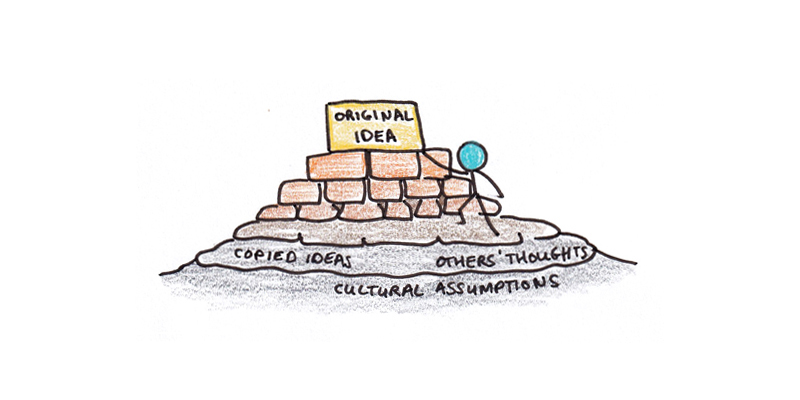Our culture celebrates originality and creativity. We want our students to think for themselves, not blindly follow tradition, authority and received opinion. After all, doesn’t science, art and politics depend on us all coming to our own answers?
I definitely support the idea of coming to your own beliefs about things. But the way we do it isn’t how it is often portrayed. Thinking for oneself means, first, grappling with a lot of thoughts of other people. Creativity depends on copied insights. Originality is built from mastery.

Descartes’ Error
Our confusion about thinking can be traced back to the philosopher Rene Descartes. The Frenchman, while stationed in Dutch-speaking Neuburg an der Donau, decided to withdraw into his room, heated by his stove, so he could think for himself.
From his physical and social isolation, Descartes would work out a new philosophy. He decided to toss aside any of his knowledge that could be faulty. He would work from first principles only on the things he knew from direct experience were undeniably true. This, in turn, led to his formulation, “I think, therefore I am.” Arguing that even if the entire world around him was an illusion, it could not be an illusion that he was, in fact, thinking.

This moment set in motion modern philosophy, and with it many of the long-standing difficulties about knowledge, reality and morality.
Except, it’s possible that Descartes wasn’t quite as isolated as it seems. According to historian David Wootton, a Dutchman by the name of Isaac Beeckman may have suggested some of Descartes initial ideas.1 Descartes bitterly rejected the possible influence on his ideas, but his defensiveness may have had more to do with how it conflicted with his ideal of total introspection in his philosophy.
Thinking for Yourself, Through Others
If even Descartes’ puritanical quest to reason purely from first principles was influenced by outside opinion, how can we possibly think for ourselves?
The answer, of course, is the same way everyone does. You think for yourself first by learning a lot of the thoughts of other people. Other thoughts and ideas don’t pollute originality and independence, they create the preconditions for it.

The person who claims to think for himself, yet scorns learning from other sources, invariably is under the hidden influence of a source he doesn’t recognize. The only way to truly think independently is to have enough knowledge to spot the hidden assumptions that underwrite your current views.
Groupthink and Conformity
Of course, accumulating knowledge doesn’t always lead to independent thought. We all can point to instances of groupthink, where the more people discuss, the more they form a consensus that turns out to be wrong.
Similarly, schooling is often just as much about obedience as it is about learning. We teach the scientific method, but mostly in the same way as religious scriptures—facts brought to us by authority, rather than truths discovered through experience.

Yet, in both cases, the problems of conformity and false consensus are solved by… more learning. As you encounter more ideas and arguments, you start to spot the holes in foundations that previously felt unassailable. Reading a single book makes you feel that the author has it all figured out. Reading a dozen quickly shows that he doesn’t.
Thinking and Learning are Two Sides of the Same Coin
If you want to think for yourself, the only path forward is to learn more. Not just from those who have the same opinions you do, but from everyone who disagrees. And not just the average person who disagrees, but the smartest people who object.
If an idea is popular among intelligent people, but strikes you as completely wrong… you’ve probably misunderstood it. This isn’t that every idea believed by smart people is necessarily correct, many of them contradict. But if you can’t see why smart people could believe it, you’ve probably failed to understand the actual argument.
Descartes was wrong. We can’t begin at a position of independent thought, and from that, deduce the truth of the universe. Instead, we begin as captives of the beliefs that permeate our surroundings. We construct our freedom through learning more, not by ignoring the thinking of other people, but by diving straight into it.
This essay is part of a series leading up to a new session of my course, Rapid Learner. If you’re interested in diving deeper into research and strategies to learn more effectively, be sure to sign up.

 I'm a Wall Street Journal bestselling author, podcast host, computer programmer and an avid reader. Since 2006, I've published weekly essays on this website to help people like you learn and think better. My work has been featured in The New York Times, BBC, TEDx, Pocket, Business Insider and more. I don't promise I have all the answers, just a place to start.
I'm a Wall Street Journal bestselling author, podcast host, computer programmer and an avid reader. Since 2006, I've published weekly essays on this website to help people like you learn and think better. My work has been featured in The New York Times, BBC, TEDx, Pocket, Business Insider and more. I don't promise I have all the answers, just a place to start.